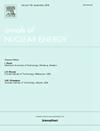Effect of hydration at various temperatures on the thermal conductivity of compacted Indian bentonites
IF 1.9
3区 工程技术
Q1 NUCLEAR SCIENCE & TECHNOLOGY
引用次数: 0
Abstract
Thermal conductivity of bentonite is one of the key parameters influencing thermal behavior of geological repositories, where bentonite can serve as a buffer material. This study experimentally investigated the effects of hydration period with temperature (27℃→80℃→100℃→120℃) on the thermal conductivity of bentonites, compacted with varying water content and dry density. It was observed that thermal conductivity increased with hydration period at 27℃ for specimens with lower water content, whereas it decreased for those with higher water content for given dry density. However, it increases with temperature, increased significantly during early hydration period and tended slow rate increase after 5 days of hydration for temperatures above 80℃. The change in thermal conductivity with temperature during hydration was minimal for dry specimens, whereas it changed significantly in specimens with higher water content. Hydration of compacted bentonites with various temperatures decreased inter-aggregate pore fractions, increasing particle contact area, confirmed by microstructure investigations.
不同温度下的水化作用对压实印度膨润土导热性能的影响
膨润土的导热系数是影响储层热行为的关键参数之一,膨润土可作为储层的缓冲材料。实验研究了温度(27℃→80℃→100℃→120℃)下水化时间对不同含水量和干密度压实膨润土导热系数的影响。在27℃时,在一定干密度下,含水率较低的试样的导热系数随水化时间的延长而增大,而含水率较高的试样的导热系数随水化时间的延长而减小。随着温度的升高,水化前期显著升高,80℃以上水化5 d后,水化速率趋于缓慢。在水化过程中,干燥试样的热导率随温度的变化最小,而高含水量试样的热导率随温度的变化显著。微观结构研究证实,不同温度压实膨润土的水化作用降低了聚集体间孔隙分数,增加了颗粒接触面积。
本文章由计算机程序翻译,如有差异,请以英文原文为准。
求助全文
约1分钟内获得全文
求助全文
来源期刊

Annals of Nuclear Energy
工程技术-核科学技术
CiteScore
4.30
自引率
21.10%
发文量
632
审稿时长
7.3 months
期刊介绍:
Annals of Nuclear Energy provides an international medium for the communication of original research, ideas and developments in all areas of the field of nuclear energy science and technology. Its scope embraces nuclear fuel reserves, fuel cycles and cost, materials, processing, system and component technology (fission only), design and optimization, direct conversion of nuclear energy sources, environmental control, reactor physics, heat transfer and fluid dynamics, structural analysis, fuel management, future developments, nuclear fuel and safety, nuclear aerosol, neutron physics, computer technology (both software and hardware), risk assessment, radioactive waste disposal and reactor thermal hydraulics. Papers submitted to Annals need to demonstrate a clear link to nuclear power generation/nuclear engineering. Papers which deal with pure nuclear physics, pure health physics, imaging, or attenuation and shielding properties of concretes and various geological materials are not within the scope of the journal. Also, papers that deal with policy or economics are not within the scope of the journal.
 求助内容:
求助内容: 应助结果提醒方式:
应助结果提醒方式:


